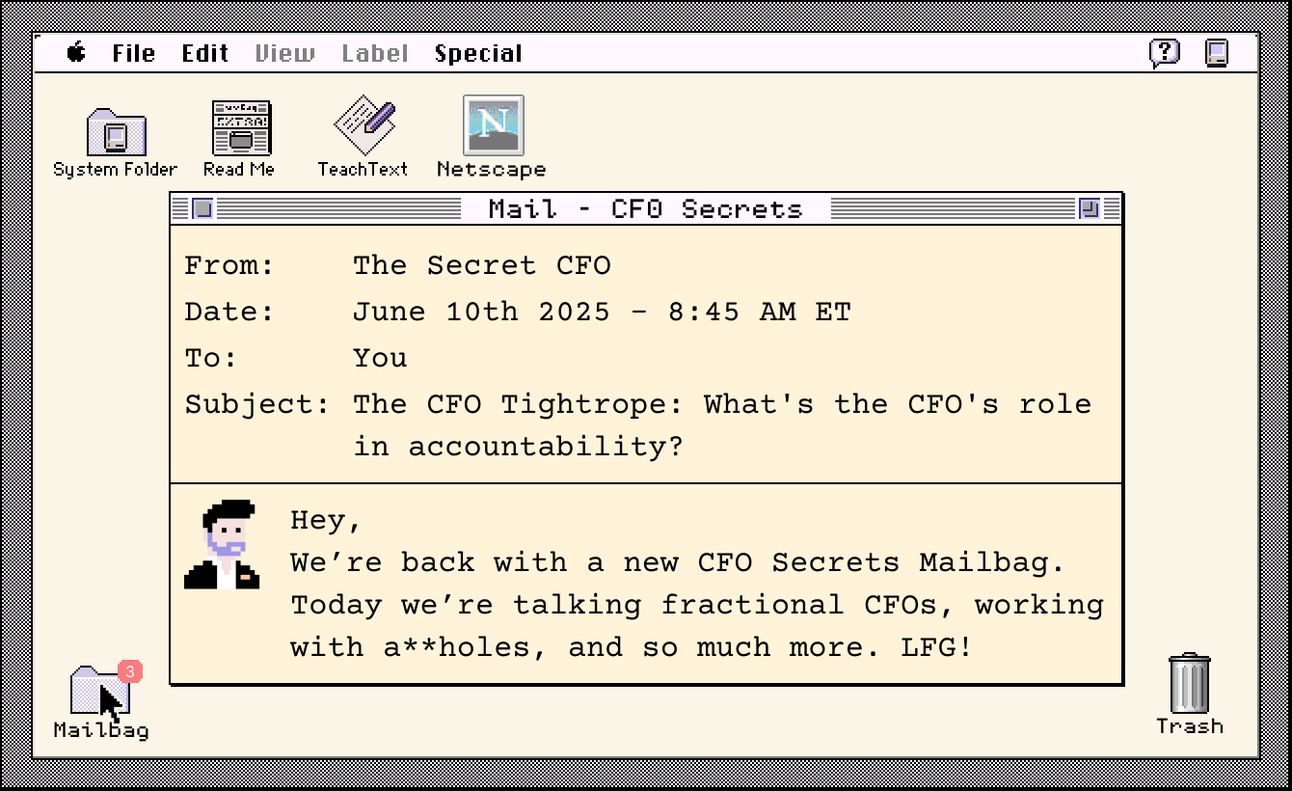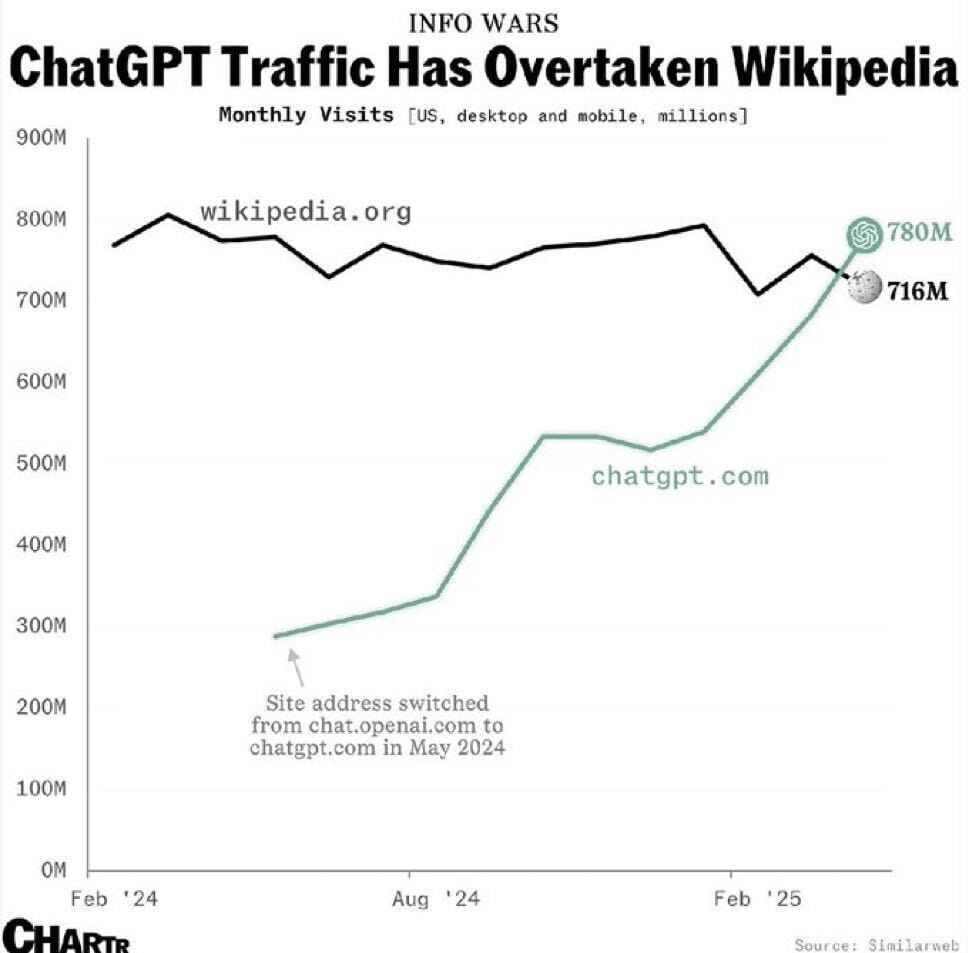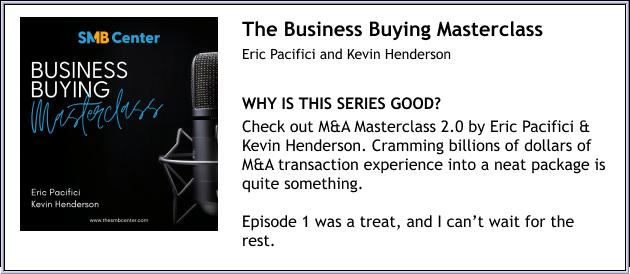

Is your cash flow under control?
Finance leaders rely on this checklist to stress-test cash processes, tighten forecasting, and uncover critical blind spots.
Cut through the chaos and gain peace of mind. No matter how many accounts, currencies, and entities you’re juggling.


Anonymous from the Midwest asked:
I’ve been in FP&A for a small company for the past few years. I want to niche down to even smaller companies, or even fractional CFO work. For that, I feel like my biggest blind spot is in the day-to-day accounting. Most small companies outsource this to outside accounting firms, but even to manage them, I think I should have a better understanding of QuickBooks, journal entries, closing, etc., which I’m not all that close to currently. I have my CFA, so I definitely understand accounting at a high level.
What’s the best way to set myself up for success here?
Thanks! Love your content.

Thanks Anon.
Your CFA will give you the big picture, but I’m afraid it’s not particularly useful in an SMB setting. Transactional accounting is a different thing altogether. So you’re absolutely right to highlight this. Small company accounting means getting hands-on. I think you will need to know how to close a set of books.
Some say that fractional CFOs and bookkeeping are two different things. They are. But if I’m paying $5–10k a month for a fractional CFO, you can bet I expect you to oversee my books. And how can you be sure your analysis is useful if you don’t know whether the numbers are right to start with?
The good news is you can probably pick it up pretty quickly. You’ve got experience in FP&A, and if you structure your practice the right way, you can hire, outsource, or offshore the day-to-day bookkeeping. You don’t need to do the books, but you do need to know when they’re wrong. And why.
You’ll learn fastest by shadowing a good bookkeeper through a couple of closes. Don’t just read about it. Get in the weeds. Watch how the sausage gets made.
So I’d probably lean toward fractional rather than full-time in a small company where you could be a one-person team and your accounting gap would be exposed.
Margins are fairly tight in the fractional CFO model, and it’s hard to scale profitably. But if you position yourself as a lead operator supported by a small team, servicing 5–10 clients paying $10k/month, you can build a tight, solid business, and have enough room to hire people who know what they’re doing.
You can also reduce your exposure by onboarding clients into a modern tech stack: spend cards, payroll, billing automation, etc. Most of these integrate directly with QBO and reduce the need for manual accruals or judgment-heavy journals. So automate hard, hire well, pick the right clients, and you’ll be on your way.
There are several fractional CFO ‘support groups’ and communities out there. It might be worth joining them so you know what you are getting into.
Thanks for the question, and good luck.


Andre from London asked:
How do you overcome disliking someone (co-founder, board member, someone with power) to still being able to build a relationship and act as an effective CFO?

Andre, this is something you are going to have to get good at. You will inevitably work with people you don’t like. Especially in the boardroom. It’s full of egos, strong personalities, and even outright a**holes. That said, it’s not easy to reach the top floor of a company with zero relationship-building skills, so these people might be easier to like than you think.
Here’s how I approach it:
First, don’t rush to judgment. Often, you’ll find that if you work closely with someone for long enough, you will eventually see them in a different light. I can think of a few times in my career where, after 6 months, I was convinced I was working for a d*ckhead, but I changed my mind later. And in fact, one example where they went on to become a great friend. The same works in reverse, too. Some people whom I’ve liked on first impression made me change my mind pretty quickly when I saw what they were really made of.
Second, respect matters more than likability. You can work effectively with someone you don’t like if there’s mutual respect. But if you don’t respect them for their judgment, values, or competence, that’s when the foundation starts to crack. Respect creates room for professional trust, disagreement, and alignment.
Next, anchor the relationship in the work. Shared goals should mean you want the same things. Focus the relationship on execution, performance, and outcomes. You don’t need emotional chemistry, you need functional alignment. Sometimes, you just have to hold your nose and carry on.
Be the one to make the effort. There is a quote about marriage that goes something like: “A marriage is a 50:50 partnership where both parties put in 60% of the effort.” So, make sure you are doing more than your fair share of the work building the relationship.
Finally, if there is no respect and no rapport, it’s a red flag. Dislike alone isn’t fatal, far from it. But if you don’t respect the people you are working with, that’s a sign you are in the wrong place (or at least with the wrong people).
Best of luck, Andre.


LZ from London asked:
In a private equity-backed company, what is the role of the CFO when it comes to reporting lines and overall accountability? If the organisational chart states that the CFO reports to the CEO, can you please explain how to manage conflicting situations with the CEO when the board/investors push to get to the bottom of the issues? How much can a CFO bend the truth without damaging his/her reputation?

Welcome to the CFO tightrope. Forget the org chart, it’s kind of irrelevant.
This is one of the hardest (and most defining) realities of the job. And it’s not just an issue for PE-backed CFOs. I’ve been in situations where the CEO, board chair, and audit committee chair were all saying different things on an important issue, each with their own agenda.
You’re operationally tethered to the CEO, but you’ve also got fiduciary duties to the board and, in your case, probably a dotted-line relationship to the PE sponsor. That is a tough line to toe.
Here are a few ideas to help you walk it:
1. Your Reporting Line Is Not Your Only Accountability
Yes, you ‘report’ to the CEO. But in a PE-backed business, you’re also accountable (directly or indirectly) to:
The Board
The PE sponsor
The Audit Committee (if you have one)
And most importantly, you’re accountable to the truth. It takes decades to build a reputation and minutes to destroy one.
2. You Are Not Your CEO’s PR Team
You work with your CEO daily, and that relationship must be built on trust and transparency. But transparency doesn’t mean parroting their narrative, especially if it’s off-base.
If something being passed to the board is misleading (or flat-out wrong), your job is to correct the record. Silence isn’t neutral. If you know something is false and don’t speak up, that’s on you.
The CEO may not be there in 12 months. The PE board likely will be (unless they exit). And if the CEO gets axed and the board sees you as “the CEO’s guy or gal,” you’re toast, especially if they discover you’ve been part of the messaging, even passively.
Think of yourself as the last line of defense between the board and bad data.
3. Don’t Blindside Your CEO
Disagreeing with your CEO in the boardroom is fine (under the right circumstances). But…
Never surprise them. That’s a trust killer.
Resolve it beforehand. Always try to align on differences before the meeting. And if you can’t, make it clear you’ll be raising the issue and why.
Pick your battles. Don’t be that CFO who challenges everything unecessarily. Use this sparingly and only when it truly matters.
I’ve spoken out in disagreement with my CEO in board meetings before. But they always knew it was coming. It made our relationship stronger, and it boosted my credibility with the board, who saw I had an independent voice while remaining loyal to the exec team.
4. Don’t “Bend the Truth” With Your Board
Your original question was: how much should you bend the truth?
Answer: You shouldn’t.
Facts are facts. Judgments are judgments. You’re entitled to your own opinions, not your own facts.
So ask yourself: are you bending the truth? Or giving your opinion on something subjective? One is ok, the other is not. And if you are giving an opinion, are you doing so with integrity and independence?
Only you can answer that. But be honest with yourself.
Hopefully, these principles can help you a bit. Best of luck, LZ.

A few of the biggest stories that every CFO is paying close attention to. This is the section you probably don’t want to see your name in.
One of the challenges with demergers is turning one big broad cost base into two leaner structures. Looks like Warner Brothers are getting ahead of that challenge by putting a CFO in as CEO for the TV business. Big changes ahead for Bugs Bunny.
This story has it all: money laundering, bribery, and the Mexican drug cartels. The freight forwarding company is accused of smuggling billions of dollars worth of goods into Mexico from the US with the help of fraudulent accounting, kickbacks to officials, and the protection of one of the most notorious gangs in the world. That’s one way to avoid reciprocal tariffs…

ICYMI, here are some of my favorite finance/business social media posts from this week. In the words of Kendall Roy, “all bangers, all the time.”:

This is the kind of pedantry we all aspire to:

If you’re looking to sponsor CFO Secrets Newsletter, fill out this form, and we’ll be in touch.
Find amazing accounting talent in places like the Philippines and Latin America in partnership with OnlyExperts (20% off for CFO Secrets readers)
If you enjoyed today’s content, don’t forget to subscribe.
Let me know what you thought of today’s Mailbag. Just hit reply… I read every message.
In Saturday’s newsletter, I broke down why I hate rolling forecasts… and why I might be wrong. Check it out here.


Disclaimer: I am not your accountant, tax advisor, lawyer, CFO, director, or friend. Well, maybe I’m your friend, but I am not any of those other things. Everything I publish represents my opinions only, not advice. Running the finances for a company is serious business, and you should take the proper advice you need.



